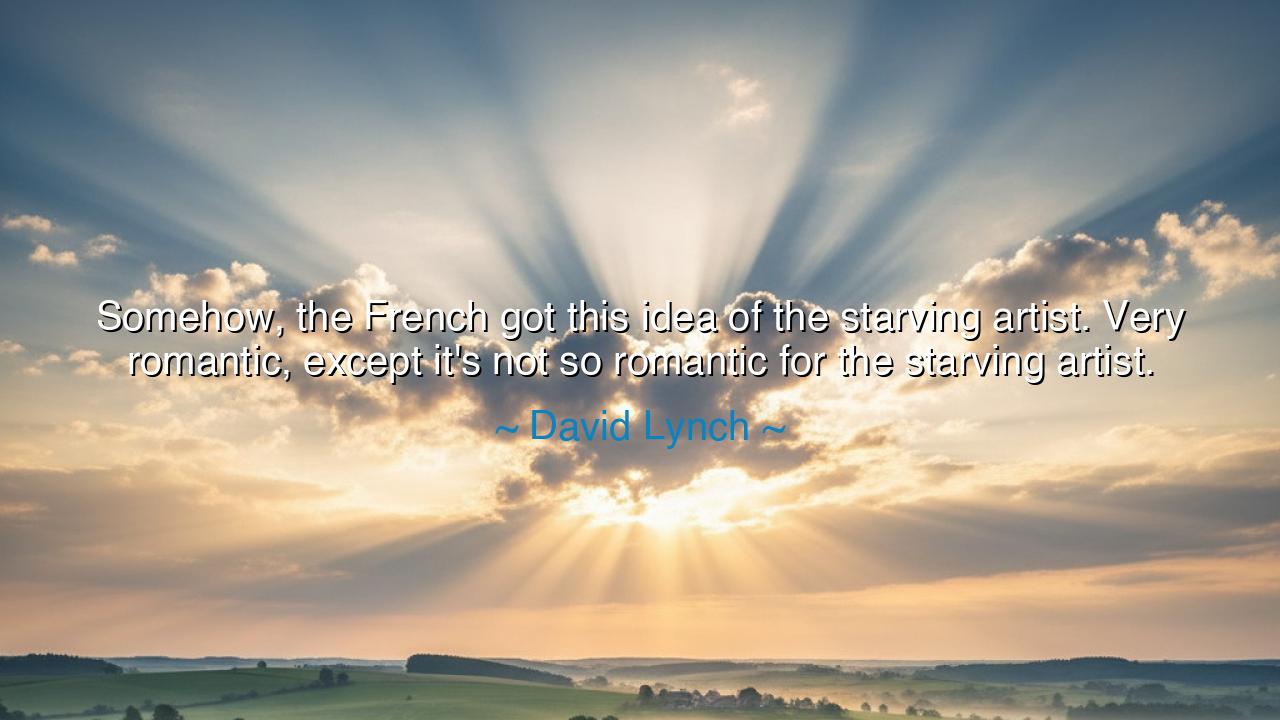
Somehow, the French got this idea of the starving artist. Very
Somehow, the French got this idea of the starving artist. Very romantic, except it's not so romantic for the starving artist.






Hear the wry but piercing words of David Lynch, who once said: “Somehow, the French got this idea of the starving artist. Very romantic, except it’s not so romantic for the starving artist.” In this remark, half humorous, half bitterly true, Lynch exposes the gulf between myth and reality, between the image society loves to celebrate and the suffering endured by those who live it. For to the outsider, the vision of the ragged poet in a Parisian garret may stir the imagination. But for the one who shivers in that attic, stomach empty, rent unpaid, hope fading—the romance dissolves quickly into pain.
The romantic image of the starving artist was born in the 19th century, particularly in Paris, when writers, painters, and musicians crowded the Latin Quarter in poverty. The Romantics and later the Bohemians gave rise to tales of young geniuses who, though poor in coin, were rich in spirit. These figures were celebrated as martyrs of beauty, souls who sacrificed comfort for creation. The French, especially, cultivated this image in literature and art, raising it into legend. Yet Lynch reminds us of the cost—that the poetry of the myth rests upon the suffering of real lives.
Consider the story of Vincent van Gogh, perhaps the most famous of all starving artists. He painted with fire in his soul, producing hundreds of works that today are priceless. Yet in his lifetime, he sold almost nothing, living in squalor, dependent on the charity of his brother. To the world, he has become a symbol of the misunderstood genius, the romantic figure of pure art untainted by commerce. But to Vincent himself, it was despair, hunger, madness, and loneliness. The world calls his poverty romantic; to him, it was torment.
The danger of this myth is not only in its cruelty to the artist, but in how it glamorizes suffering. Young creators are taught that to be truly great, they must embrace poverty, endure hunger, live in shadows. Society excuses its neglect of art by dressing deprivation in the clothes of nobility. But what Lynch unveils is the hypocrisy of this arrangement: the romance belongs to the spectator, not the sufferer. For the artist, there is no romance in an empty belly or an unpaid bill—only the grinding weight of survival.
And yet, within this paradox lies a deeper truth: suffering does not make art, but art can transmute suffering. Van Gogh, impoverished and broken, turned his agony into visions of color that now move the world. Writers like Dostoevsky, imprisoned and penniless, drew from their anguish to create stories that still echo with power. The romance is not in the hunger itself, but in the courage to wrest beauty from it. What the French myth misunderstood was not that struggle exists, but that the nobility lies in the art, not in the deprivation.
The lesson, therefore, is clear: do not idolize the image of the starving artist. Honor instead the labor, the vision, the discipline, and the soul that creates. Support the artist not with empty praise of their suffering, but with sustenance, recognition, and dignity. For art does not require starvation to be pure; it requires truth, imagination, and persistence. To romanticize poverty is to abandon responsibility. To nurture artists is to ensure that their flame can burn without being extinguished by want.
Therefore, children of tomorrow, remember Lynch’s words. Celebrate not the myth of the starving artist, but the triumph of the living artist who dares to create. Do not think deprivation itself is noble—think instead of how much greater beauty might be born if the artist were freed from it. For the world is richer when its dreamers are not left to starve in attics, but given space to flourish.
Thus Lynch’s jest becomes eternal counsel: what seems romantic from afar may be brutal in truth. See beyond the myth. Honor the artist not for their hunger, but for their creation. For in supporting them, you sustain the very soul of humanity.






AAdministratorAdministrator
Welcome, honored guests. Please leave a comment, we will respond soon